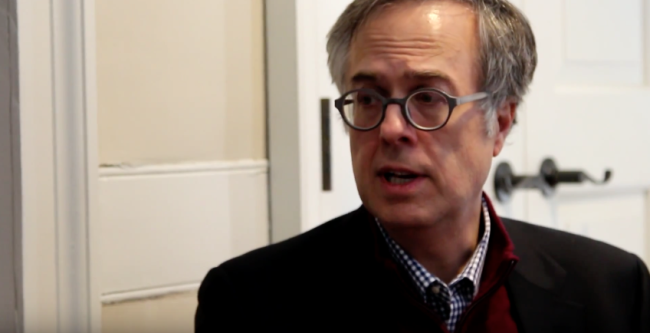With the backdrop of the upcoming presidential election, Michael Gerson, a nationally syndicated columnist with the Washington Post and former speechwriter for George W. Bush, arrived on campus as the Hunter B. Andrews Distinguished Fellow in American Politics. Created in honor of the former Virginia state senator, the annual fellowship invites a member of the political community to the College of William and Mary to share insight and analysis.
By the end of his second day on campus, Gerson had attended a public policy class, spoken at the Marshall-Wythe School of Law and discussed his career with the College community. According to Gerson, these conversations often surrounded specific news topics — the 2016 presidential elections featuring prominently — but more broadly, too, on the current operation of the American political system.

Regarding his time on campus, Gerson said he was pleased.
“It’s been fantastic,” Gerson said. “The kids are amazing, the questions are good, the times are interesting, because the political world right now is in the midst of convulsions. So people were very interested in what’s going on in the electoral process.”
Recently, Gerson has written extensively about one part of the electoral process: Donald Trump’s candidacy. Out of the 24 articles he has written so far in 2016 as of April 8, only six of them did not have Trump at the forefront. With titles like “Trump is the demagogue that our Founding Fathers feared,” and “Donald Trump and the politics of the middle finger,” Gerson has criticized both Trump’s candidacy and the state of the 2016 election.
“I’ve been in one way or another involved in a variety of methods in trying to give America, the center right party, a message of social justice,” Gerson said. “And that project is very much under question in the Trump era. He has substituted a much more narrow and nativist version of what the party should be, and so it’s undermining a lot of things I believe in quite strongly.”
Gerson said his continuous criticism of Trump stems from the political significance. With the rise of nativism at the forefront of the campaign, Gerson said he regards the 2016 presidential election as an important test for the future of the Republican Party.
However, for Gerson, another principal reason for his coverage is more personal.
“I’ve been in one way or another involved in a variety of methods in trying to give America, the center right party, a message of social justice,” Gerson said. “And that project is very much under question in the Trump era. He has substituted a much more narrow and nativist version of what the party should be, and so it’s undermining a lot of things I believe in quite strongly.”
As the months until the general election dwindle, Gerson said he expects to see a historic and fascinating fight.
Working with the Washington Post since 2007, Gerson said he has appreciated the individualism and freedom provided by his role. However, he said that writing a column is not as consequential to the country as public service.
In early 1999, Gerson was recruited to work for then-presidential hopeful George W. Bush’s campaign. After a successful bid for the White House, Bush asked Gerson to stay on as a policy advisor and speechwriter.
Gerson explained government speechwriting as a corporate process; although the writer often puts the first draft on the table, many people review it and the president ultimately has the final say before delivery. Gerson said that what he relinquished in autonomy, he gained in purpose.
“I came away from my government career thinking it’s a noble thing to serve the country and that’s true whether you’re a Democrat or a Republican,” Gerson said. “And I admire the people that make sacrifices to be in government. So even though my interests were writing and journalism, I saw first-hand the power of the government to do good … I did not come away disillusioned in any way.”
Although now a prominent member of his field, Gerson did not always envision a career in politics and journalism. After graduating as a theology major from Wheaton College in Illinois, Gerson nearly attended school to obtain a doctorate in theology. An unexpected job opportunity stemming from his column in Wheaton’s student newspaper ultimately led him away from academia. According to Gerson, it was in college when he truly learned how to think and write.
“I came away from my government career thinking it’s a noble thing to serve the country and that’s true whether you’re a Democrat or a Republican,” Gerson said. “And I admire the people that make sacrifices to be in government. So even though my interests were writing and journalism, I saw first-hand the power of the government to do good … I did not come away disillusioned in any way.”
“I think the only worthwhile enterprise of undergraduate education is to learn how to think,” Gerson said. “And I think liberal arts schools have a tremendous advantage in that. And then the second thing is — that’s not the only one — because the second thing is how to write, which is the organization of thought. I think liberal arts schools have an advantage there as well.”
Because of those advantages, Gerson said that he is a big fan of the liberal arts.
Going forward in his career as a columnist, Gerson expressed interest in further exploring the Democratic side of the presidential race, including Hillary Clinton, who he said has not been a particularly effective candidate in his perspective. Gerson also has eye on an issue affecting many on both the right and the left — wage stagnation for working class people.
“I’d really like to write more on this issue of social mobility — what would really make a difference to help people get the skills, education, social capital they need to succeed in a modern economy,” Gerson said. “That’s what our politics should be focused on right now.”

